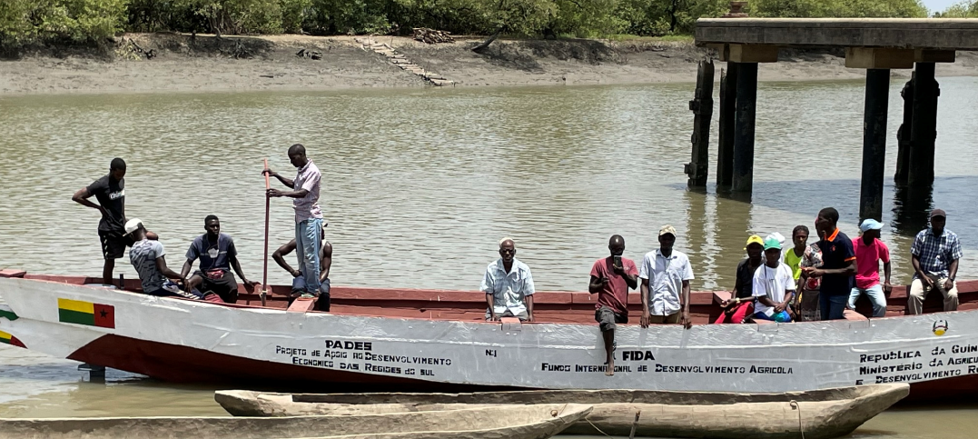Principle-based evaluation policy and practice required in new world order - IOE
Cairo, 15 February 2024 – “We need a principle-based approach to evaluation policy and practice to ensure that M&E is optimally pitched to bring about the transformation that is necessary. This means moving away from the use of ahistorical country ratings and simplistic criteria that do not reflect the new world order. For this to happen, there must be a critical approach to setting up evaluation, merging best thinking, recognizing the politics of the craft and drawing-in stakeholders. Egypt Vision 2030 offers a shining example. The development agenda reforms planning and M&E by applying the methodology of programmes and performance-based budget plans”, affirmed Dr Indran A. Naidoo, Director of the Independent Office of Evaluation of IFAD (IOE), in his keynote address during the 10th EvalMENA Annual Meeting and First National Egyptian Association for Evaluation (EgyEval) Meeting, on 15 February 2024.
EgyEval hosted the 10th EvalMENA annual meeting in Cairo, from 12 to 15 February 2024. The conference was held in the Institute of National Planning of the Ministry of Planning and Economic Development, under the auspices of Her Excellency the Minister of Planning and Economic Development, Dr. Hala El Said. The theme for this year was ‘Institutionalization of Evaluation in Arab Countries: An Approach to Realize SDGs Based on Evidence, and the Role of National Evaluation Associations’. The primary objective of the meeting was to share the experiences of Arab Evaluation Associations regarding the institutionalization of program, projects, and policy evaluation for development. To this end, the event explored ways in which development partners support national efforts and generate recommendations at both regional and national levels.
The IOE Director opened the proceedings of the third day of the conference, addressing the importance of effective evaluation architecture for attainment of the SDGs in a session titled ‘Partnerships needed for Financing owned Evaluations’. The session was chaired by Dr Doha Mounir Abdelhamid, Senior Economics and Development Evaluation Expert, and also featured a presentation by Ian Goldman, President of the International Evaluation Academy. Dr Naidoo drew on lessons from the work of IOE and IFAD in Egypt, as well as on experiences from the National Evaluation Capacity (NEC) series, which was held in in Hurghada, Egypt, in 2019, and which became the largest evaluation event by government representation globally under Dr Naidoo’s six-year tenure as Director of the Independent Evaluation Office of UNDP.
“Parts of global oversight continue to rate countries as if there is no past. Remnants of classic thinking remain, plagued by simplistic assumptions and the conduct of evaluation in linear terms. This approach fails to recognize the complexity of the world we live in”, stated Dr Naidoo recalling that, in essence, evaluation should be used to reduce inequalities and promote sustainable development.
In response to these shortcomings, strong monitoring and evaluation systems need to be implemented at the national, local and provincial levels in order to ensure that limited resources are optimally utilized to achieve development objectives, explained the IOE Director. Evaluation must strive to help countries accelerate attainment of Agenda 2030. However, SDG progress has been derailed by COVID-19, and is further compounded by the global perma-crisis that we live in. The effects of COVID-19 will continue into the future because they have disrupted the way in which matters such as remittances, value chains and financial flows work.
Against this backdrop, Egypt produced a very good UN socio-economic response plan during the pandemic, which led to a re-prioritization of resources in order to build back better. The development agenda of Egypt is very clear, as articulated by the national government in the ‘2030 Egypt Vision’. Egypt also plays a strong role internationally, including by engaging with IFAD and sitting on the Fund’s Evaluation Committee.
“The government of Egypt shows the highest level of transparency and engagement in improving the development impact of the country. IFAD has continued to support the government and has benefitted from close engagement with H.E. Dr Rania Al Mashat, Egypt's Minister of International Cooperation, who recently launched IFAD’s 13th replenishment meeting. Egypt is now also part of a broader coalition working within the construct of Africa and in liaison with international financial institutions and UN agencies”, underscored Dr Naidoo.
The four-day conference also looked at the existence of national evaluation policies through which the programs implemented to achieve sustainable development within the framework of the state's vision and SDGs are evaluated, and the institutions that do so are evaluated. Further discussion addressed the evaluation of policies adopted by the State as a basis for guidance when developing development plans. This included institutional and policy evaluation, and communicating and using the evaluation results at all levels.
For further information, please contact Alexander Voccia [here]
RESOURCES
- To access Dr Naidoo’s presentation, please click here.
- To access the Egypt Vision 2030, please click here.
- To access the book ‘Policy Evaluation in the Era of COVID-19’, please click here.
- To access the IFAD Evaluation Manual, please click here.
- To access the proceedings of NEC 19, please click here.
- To access IOE’s most recent evaluation reports carried out in Egypt, please click here, here and here.
- For more information on the IFAD Executive Board mission to Egypt, please click here.
- To access the Big Book on Evaluation Good Practice Standards, please click here.
IOE 20th ANNIVERSARY
- To access the brochure ‘More than a journey | 20 years of independence, please click here.
- To access Fabrizio Felloni’s interview on the evolution of independence of IOE, please click here.
- To learn why independent evaluation makes IFAD a more credible institution, please click here.
CONTACTS


